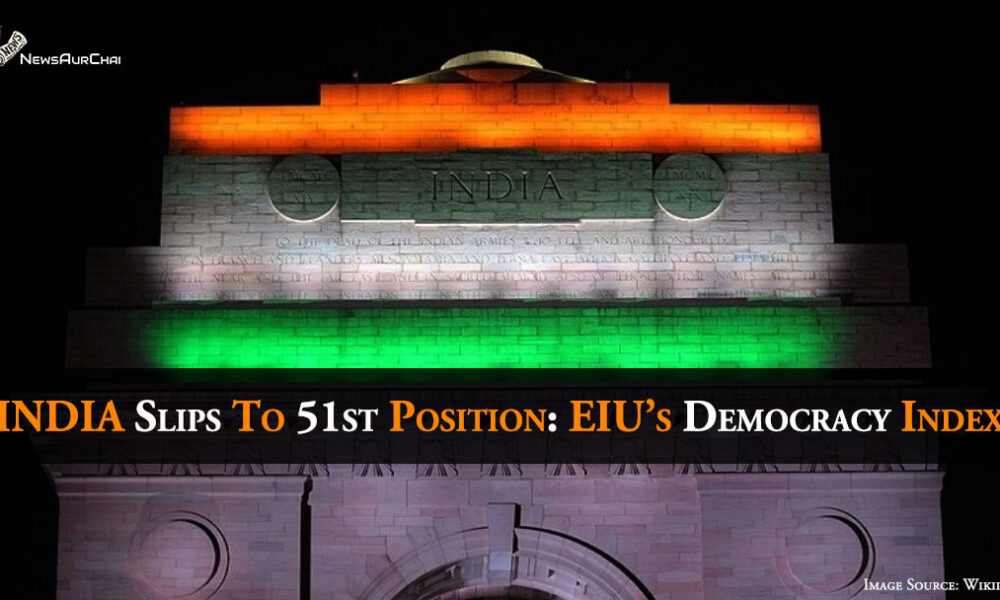For those of us who are unaware of the recent happenings, it’s time for enlightenment. What is said to be the largest democracy in the world, India, has dropped ten places, with an overall score of 6.90 in 2019 with respect to EIU’s Democracy Index. The country has plummeted down (from its previous 41st place ) to being 51st out of 167 countries on the Democracy Index put together by the Economist Intelligence Unit.
Surprised? I guess not.
The Economist Intelligence Unit (EIU) is the research and analysis division of The Economist Group–a British multinational media company. It provides forecasting and advisory services through research and analysis, such as monthly country reports, five-year country economic forecasts and more. The company also publishes several reports each year focussing on current issues affecting specific countries, regions and industries.
Some may wonder what kinds of aspects are kept in mind when forming the democracy index. Well here they are: (Numeric score of our country out of 10)
- The Electoral Process and Pluralism (8.67) Civil Liberties of the Citizens (6.76)
- Efficient Functioning of Government (6.67)
- Political Participation (5.63)
- Political Culture (6.76)
In addition to a numeric score and a ranking, the index categorises each country in one of four regime types:
- Full democracies
- Flawed democracies
- Hybrid regimes
- Authoritarian regimes
According to our latest #DemoIndex, only 5.7% of the world’s population lives in a “full democracy” and more than one-third under authoritarian rule. Download the report to find out how global democracy fared in 2019: https://t.co/c95AlwDTkx #democracyindex pic.twitter.com/JPCyzyVpqh
— Economist Intelligence: EIU (@TheEIU) January 22, 2020
As seen in the picture above, India is covered in light green -indicating a flawed democracy.
Flawed democracies – as defined by Wikipedia, are nations where elections are fair and free. Basic civil liberties are honoured but may have issues (e.g. media freedom violation). These nations have significant faults in other democratic aspects, including underdeveloped political culture, low levels of participation in politics, and issues in the functioning of governance. Well, this does sound familiar, doesn’t it?
India’s overall score fell from 7.23 in 2018 to 6.90 in 2019. This is the lowest score the country has ever recorded since 2006 – the beginning of the index. The reason behind this drop as it was reported in the Economist was due to ‘erosion of civil liberties’ in the country. The factors that have contributed to this observation were that of– protesting nature which has often led to many disagreements between the civilians and the governing body. The Citizenship Amendment Act (CAA) 2019, the situations in Jammu and Kashmir and the controversial NRC (National Register of Citizens) have all contributed to the hard-hitting fact that our country has a flawed democratic system.
It is also believed that the decline will continue in 2020 as per the observations made by the EIU. Jammu and Kashmir’s security lockdown, deployment of the soldier, no access to the internet and the fact that major opposition politicians, including three former Chief Ministers, continued to be detained more than five months after the centre withdrew Article 370 all contribute to the factors of democratic importance.
Let’s not forget the widespread protests against the citizenship law, which makes religion a test of citizenship for the first time in India’s history, and the NRC, which was carried out in Assam last year and excluded 19 lakh people. The government indicates that the CAA will help non-Muslim refugees fleeing from neighbouring countries due to persecution. However, opposition parties and activists say it discriminatory towards Muslims and violate the secularity mentioned in the Constitution.
With countries like Norway and Iceland topping the list, China and North Korea towards the bottom- One question remains-Is it likely for India to climb up higher or stoop down lower?
Is the government accepting this downward spiral? Will, there ever be hope for India to be named once again as the world’s largest democracy?
